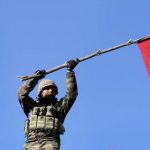When Turkish pollster Konda released polling results last month showing a tripling in the number of atheists in Turkey, it was enough to evoke weeks of debate and a host of op-eds and articles trying to explain the apparent turn away from faith in a deeply religious country.
Though Konda said the rise from 1 percent to 3 percent was not in itself statistically significant, the responses to other questions showed a similar downward trend in the proportion of Turks who take part in religious fasting and those who call themselves religious or very religious. The results have been interpreted by some as showing that the policies of Turkey’s Islamist ruling Justice and Development Party (AKP), including the Islamisation of the country’s educations system, have failed to achieve the party’s aim of “raising a pious generation” 16 years after it attained power.
At the same time, the party’s authoritarian inclinations have been amplified since it survived a coup attempt in July 2016, and this has shaken some Turks’ faith in religion to its core.
“I no longer take any pleasure from the call to prayer. I see it as a political show put on by political Islamists,” said A.C., a Turkish citizen who has found himself in exactly that position.
A.C. is one of thousands of Turks who found themselves dismissed from their jobs, detained or arrested after being named in one of the presidential decrees issued under the two-year state of emergency after the coup attempt. The government said the purges were designed to remove members of the outlawed Gülen religious movement blamed for the coup from state institutions. Critics have said they were used to silence dissent from all quarters.
A.C. is also one of those whose experiences featured in research carried out by Bayram Erzurumluoğlu, a sociology scholar who was also the target of a decree. Erzurumluoğlu has conducted a study on how the religious views of those affected by the decrees have changed, gathering both data and personal testimony to back it up.
Ahval met A.C. and other respondents in Erzurumluoğlu’s study whose faith had been shaken after falling victim to the purges.
A.C. said his warm feelings for Turkish religious officials and schools had soured to the point of hatred after witnessing sermons that he said had turned into political propaganda. He discussed a similar dynamic in the pro-government media, which he said had been used to disperse lies and was driving people away from Islam.
As a hafiz – a Muslim who has memorised the Quran – S.K. was raised with an unusually deep relationship with religion. He too described feeling alienated from religion generally and from Turkey’s religious officials in particular.
“Despite being a hafiz and a theologian, all the values I believed in have lost their meaning for me. I’m on the point of faithlessness,” S.K. said. “I’ve begun to question my beliefs and have completely lost my faith in religious officials.”
S.K. now believes in a creator god who does not intervene in earthly affairs – the view held by deists, followers of another belief system that captured headlines in Turkey last year. A report published in April 2018 showed a marked rise in deists in Konya, one of Turkey’s most religious provinces. President Recep Tayyip Erdoğan was reported to have been scandalised by these findings.
O.Z., another formerly religious woman who had fallen foul of the decrees, blamed the troubles she has faced on political Islam, which she likened to a “mass extermination project”.
“I no longer have any love for those close to me who support the ruling party,” O.Z. said. “I’ve come to see that the people I used to avoid for being leftists are in fact for more dignified and honourable, and I’ve understood what a low system political Islam is. There’s no way I want to live in the same environment as supporters of this party (AKP).”
D.Y. described becoming so estranged from society that he said he had seen his entire life’s purpose turned on its head. “I don’t believe in goodness. I don’t believe in society,” he said.
“My connection to the Islamic values I had believed in is on the point of breaking. I no longer believe there is any justice in the world,” he said.
B.Z. described a similar sense of estrangement, which in her case had left her feeling trapped and fearful.
“I’m living like a mouse, in fear. I feel like a woman who wants to get divorced, but is forced to remain at home by a husband who refuses to divorce her and instead beats her,” B.Z. said.
She too holds the religious conservative sections of society responsible, to the point she said she could no longer stand socialising with, or even be around women wearing headscarves. The religious head covering has become a symbol for the AKP, which has removed legislation preventing women wearing headscarves from working in the civil service and entering some public spaces including universities.
“I was once a religious person and a nationalist, but now I am not in the slightest bit religious or nationalistic,” B.Z. said.
So desperate has she become, B.Z. said, that she no longer saw any drawbacks to dying, though she added that she would not consider suicide due to her husband and child.
Many people have seriously considered it, however, including N.K., who said events since the coup attempt had seriously damaged his faith and left him with a deep mistrust of people wearing outwardly religious symbols.
N.E., another of Erzurumluoğlu’s respondents, said he had almost lost his daughter after her fears for the future and loss of faith in religion had driven her to attempt suicide.
“She just sleeps, she won’t leave her room or join in with any social activities, she’s deep in depression and she is using medication. I am too: I can’t sleep, and I’ve become addicted to caffeine,” N.E. said.
“I think the country has become uneducated and bigoted. I’ve seen how hollow people’s religious beliefs are, and how those who go on about Allah and the Quran worship nothing but power.”



